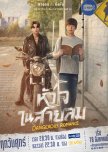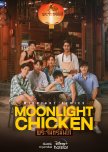
A lot of wasted potential
“Our Skyy 2” was meant to give us more of the good stuff (for those who – unlike me – enjoyed all the shows it was based on), but with a twist. At least that’s what I thought after watching the official trailer – which led me to believe, that some (or maybe all) episodes will be somehow connected with an overarching plot. That was proven as false very quickly; what we really got were 16 episodes of similar or lower quality than the original shows; see my thoughts on each special below - in the order in which they aired.“Never Let Me Go” was a terrible show and its “Our Skyy 2” episodes aren’t better. For about 30 minutes of the 1st episode Phuwin’s Nueng continues to be the same annoying jerk he was for almost the entire original series, while Pond is the same boring, stiff Palm. Again, there’s no chemistry between Pond and Phuwin – something I got used to by now; GMMTV should seriously rethink pairing those two together. The twist, plot and basically only new thing this special brought – the time-travel induced role reversal – wasn’t interesting nor amusing; it wasn’t important either. Both episodes suffered from surprisingly low production quality. I rated NLMG at 2.5 (overall) and see no reason to rate the special any higher.
“Star in My Mind”. The original show wasn’t great, it was at best decent (and a good study on why communication matters in relationships), with a few finer moments (the script of the original show had much more potential; the show could have been a much better one). The special had almost no substance; fluffy, but dragged on forever and got boring very quickly. Easily forgettable piece of BL entertainment. Dunk and Joong always seem to be more interesting off screen, but at least there was something between them – not full blown chemistry, but a spark. The Satang-Winny thing came – show-wise – out of nowhere, as their characters had no interaction in the original series; it looked like an attempt to copy their good dynamic and decent chemistry from MSP. Overall rating: 7.0.
“The Eclipse” wasn’t my favorite BL (with the plot often bordering on idiocy), but Khaotung and First did a very good job there and deserved praise. Same happened with the special – which, by the way, was the first bit of “Our Skyy 2” that I enjoyed. Overall rating: a solid 8.0 for the chemistry and originality.
“Vice Versa”: the original show was okay, albeit it was a bit disappointing with the whole parallel universe thing being merely a canvas for a BL love story (rather than an important part of the story itself). I appreciated the special for standing on its own, with a self-contained small story. Jimmy and Sea look good together, but I was never fully convinced by their acting; I won’t be the first to say that they give off buddy vibes rather than BF vibes. Overall rating: 8.0.
MSP was great (I rated it at 9.5) – which can’t be said about the special. We got more of the same fluffy and cute goodness as in the original series with some minor twists and tweaks as well as some fan service added for a good measure (#TiwPorisreal). Unfortunately all of that goodness came from recycling the original show and reusing its plot. Even the title of the special – “Multiverse of Cuteness” – was misleading, as it was implying that we’ll see a different story, a new approach, familiar characters in a new setting, facing new problems etc. None of that happened, as all we got was a rehash of what we knew. We didn’t get episodes 13 and 14 of MSP; we got episodes 1-6 again, but condensed into 2 episodes. Some will say that it was great, as many have missed those characters – and now got them for 2 more episodes; other (like me) will feel disappointed by lack of any originality. Overall rating: 7.0 due to the disappointment.
“A Boss and a Babe” was a weird, partly successful attempt at comedy merged with a BL story, mixed (very poorly) with more serious stuff; tonaly the show was all over the place. The special is more consistent – It’s a comedy. It also drags a bit and feels like 1,5 episodes stretched into 2 episodes. Overall rating: 7.0.
“Bad Buddy meets ATOTS”: I won’t event try to separate the stories of episodes 13-16 of “Our Skyy 2” and will have to rate them together – which isn’t easy. “Bad Buddy” and ATOTS are wonderful (two of my all-time favorite BLs), but very different shows and merging them is a tricky business. It should happen for a reason – and I don’t see one. Pat and Pran’s plotline isn’t a continuation of “Bad Buddy” – as we already know how that story ends; this makes their part of the special seem unimportant and a bit pointless. There’s no character development and very little of what we could consider added value. OhmNanon are in good form, but have to work with too much of (deliberately) rehashed scenes and lines – hence the freshness of Pat’s and Pran’s relationship I remember from “Bad Buddy” is absent. The 4 episodes special seems much more about Tian and Phupha and their story. The script is far from being perfect, with some key issues handled in an incomprehensible way, but the main message (eventually) does come across. I got all teary during the second half of ep. 16; EarthMix did a wonderful job there, while P’Aof actually wrote a new (but not final) chapter to the Tian-Phupha story. That saved the special, making it a worthy successor to the terrific original ATOTS. Overall rating: 8.5.
Overall rating for “Our Skyy 2”: 7.0.
Was this review helpful to you?

This review may contain spoilers
Annoying and subpar
For lack of imagination I’ll go with a bullet list for this one. Good things first (that’s going to be a short list):- Perth is okay; not great, but okay, which still makes him stand out when compared to other cast members (I refuse to call most of them actors),
- eye candy - Phuwin and Pond spend some time shirtless and look mighty fine.
Now for the bad things – and there’s a lot of them.
- False premise and misleading merchandising.
According to the initial trailer, released in 2021 (and still available on GMMTV’s YT channel), as well as to an initial MDL tag for this show, it was supposed to be about a son of a mafia boss running away from danger after his father was killed. That’s not the case – Phiphop, Nueng’s father, is a very rich businessman dealing in hotels, and though not very popular (sometimes called a crook) he’s not a mafia boss. This reduced the ‘action potential’ of the show and made it less interesting. 5 out of 12 episodes take place at a high school, not on the run from thugs – for this part of the series the show is a subpar high school BL; again: not what the show was marketed as.
- Weak story and horrible pace for a pretentious show which takes itself far too seriously.
The story suffers from several things, mainly how bland it is and how it drags. Phiphop gets killed in episode 1, but it’s not until the end of episode 5 that Nueng gets on the run. The show loses momentum immediately – following 4 episodes take place on an island, weirdly separated and mostly unaffected by events of previous episodes. With only 3 episodes left to have a confrontation and conclusion, the closer we get to the end, the more things are rushed. Furthermore, the story is unbelievable – which many reviewers critical of NLMG already pointed out on multiple examples. How is it, that Nueng – son of a powerful businessman, hated and feared, gets bullied at school for so long? Why wasn’t he protected earlier? Why was this influential family basically unprotected – not just when Phiphop was killed by a single gunman, but also for many weeks after that? Who thought that Palm – Nueng’s peer – will be a good bodyguard? How is it, that later episodes – especially those that take place on the island – are so unaffected by earlier events? It’s just baffling that after 5 episodes of an uninteresting school drama we get 4 episodes of uninteresting boyfriend time on a tropical island – and that between those 5 and 4 episodes an assassination attempt takes place. The stakes are nonexistent: all the shooting, injuring and even killing of secondary characters falls flat, fake, unimportant, since even the main characters don’t seem to care about it. At the same time the series wants to present itself as serious (see the ‘serious’ and/or ‘dramatic’ music used in ‘important’ moments and scenes – I don’t recall a single time the music was properly applied and didn’t seem over-the-top), mature and for grown-ups – which fails miserably.
- Absent chemistry and acting.
The young cast did a very poor job, with Perth being an exception. Phuwin is very good in portraying obnoxious, unlikeable characters (see Pi in FUTS) and Nueng is like that for most of the series – I doubt the showrunners wanted that. Pond is a bit better, but it’s not acting – he’s not as wooden and lifeless as I feared he’ll be, but the only reason you can watch it is because he’s goodlooking. Chimon is mostly uninteresting and at times irritating; same goes for June, who’s character was both written and portrayed as annoying. Nat plays the least intimidating villain ever, and Pawin is generally underused and doesn’t seem comfortable playing a bad guy. Jeeez, this show really comes from the same company which employs Nanon, Ohm, Khaotung, First, Fourth, Gemini or Mix, who – despite of being amateurs – can express more with a short grin or brief gaze than this entire cast?
As with many BLs, the show could have been saved by chemistry between the characters – it usually falls to the main couple to generate most of it. Unfortunately there’s no chemistry between Pond and Phuwin. There was barely any of it in FUTS and in their “Little BIG World” they gave me a vibe of two office workers forced to complete a project together (compare this to Earth and Mix, who seem to have genuine fun working with each other on EarthMix Space and their BLs). Chimon and Perth never felt like a couple and their chemistry is nonexistent.
To sum it up: NLMG is a disappointing, boring and annoying BL; steer clear of it unless you’re a diehard PondPhuwin fan.
Was this review helpful to you?

Boring waste of time
I liked the premise and idea for the plot, the relatively high production value and an array of veterans who supplemented the generally young cast (was nice to see Jakkrit Ammarat again, he played Tian’s father in “A Tale of 1000 Stars”, here he portrays King’s father; other familiar faces include Passin Reungwoot - Pran’s father from “Bad Buddy”, here as Uea’s stepfather - and Tawatson Plengsiriwat, who played Chai in “Love in the Air” and here stars as Krit).However, none of the above can change my perception of this show: "Bed Friend" is a poorly written and abysmally acted, actually bad BL. Shame, as the plot could have been developed into a much, much better script, which - with proper cast - could turn into a great BL. A bulletlist of the shows flaws includes:
- unlikeable and annoying protagonist (Uea),
- stiff/wooden acting (James has only two facial expressions: annoyed and amused; most of the young cast has no acting abilities whatsoever - and it shows),
- lack of chemistry between James and Net (chemistry between the main/only couple in a BL is mandatory - here we have a travesty of that),
- King’s actions in earlier episodes raise a lot of red flags and this isn't addressed in any way then nor later,
- the basic plot makes sense, but the script does not,
- every episode contained several filler scenes or shots, as well as scenes which were stretched beyond belief (by unnaturally long pauses, prolonged stares etc.) - all in an effort to make each episode at least 45 minutes long; this shows how little actual content there was in the script,
- annoying and/or dumb side characters, too many side characters with little or nothing to do,
- clickbait “sex” and “sensual” scenes (added nothing to the development of the plot, were included only to generate buzz and create a false impression that the show is about something; if you want to see two attractive males do sensual or sexual stuff - there's plenty of that elsewhere),
- serious issues (sexual assault, discrimination, abuse, trauma) were treated in a superficial way and either remained unresolved or were resolved in unrealistic ways (e.g. without any effort/time or offscreen).
tl;dr: this is a bad, boring BL which can be watched on fast forward with sound off.
Was this review helpful to you?

This review may contain spoilers
A near masterpiece of its genre
It's not really a review, it's a list of strengths (these are not just things I liked – these are the things that made the show successful) and weaknesses of "Bad Buddy". Generally speaking: it was the best BL I've seen, deserving high praise for direction, story, music and - most importantly - acting of Ohm and Nanon.== Strengths ==
1/ Dynamic of Pat and Pran
(1) Communication. They didn’t overanalyse things nor kept their problems and doubts to themselves – they discussed everything of importance (they argued like twice). Hence the often praised lack of toxicity, jealousy and stupid BL drama over nothing (BTW: a lot was said without uttering a word. I’m glad someone finally realized that on TV you don’t have to say everything, you can show certain things instead – with a gesture or a glance or a flashback). (2) They supported, took care of and respected each other for real. Pran calling Pat back in ep. 8 and making him feel better when he was low after an argument with Ming is one of my favourite scenes of the series – and there’s plenty of other examples of them being for one another. (3) Cuteness and banter. That’s self-explanatory, I guess. Don’t know how much of that was scripted, probably not much or none at all, but it made the two mains even more likeable. No wonder so many reactors called their relationship wholesome and healthy.
2/ Story structure and direction
(1) Simple premise and plot, no convoluted story elements (with one exception) complicating matters for the audience and the two mains. With a simple structure, the show was easy to follow. Not something widely known to BL screenwriters. (2) Focusing the story on Pat and Pran (minimizing plotlines of side characters) and then going one step further: making sure, since at least ep. 8, that no externally caused problems will destroy the relationship of the two main characters – not Pran’s fears about other people finding out about him and Pat from Pat’s IG posts, not the reactions of Pat’s and Pran’s friends, not the feud of their parents nor their wishes. Pat and Pran weren’t able to “change the world”, but didn’t let the world change them. It was their story, their love and they were in control, because they wanted it. And yes, faking a break-up and lying to their parents was an option they had the right to choose and use.
3/ Show’s self-awareness
It was a rom-com with a simple plot – and it didn’t pretend to be anything else. It also didn’t take itself too seriously – hence it was able to keep a light, optimistic tone for most of the time. Product placement was included as a necessary evil and treated as such – by both teleplay and the actors.
4/ Trope and stereotype busting
The show dealt with the “I’m straight, you’re the only man I like” trope in an unceremonious manner – laughing it out loud. It also dealt - in a more polite, but still firm manner - with assigning roles of wife and husband in same-sex relationships.
5/ Intimacy done correctly
BB features real kisses instead of the "traditional" GMMTV awkward lip-pressing. Ep. 5 rooftop kiss (The Kiss, Mother of All BL Kisses, Kiss of the Century) and ep. 11 evening beach kiss were amazing. The show also addressed sex-related issues – sometimes through metaphors, sometimes openly. According to many comments Pran and Pat are both versatile (I got that feeling myself after ep. 11 and 12), which – even if it wasn’t stated directly – is of note, also from the trope-busting perspective.
6/ Inclusion of a GL plotline
Cute, short and to the point. Story-wise it wasn’t a necessity, but it got the deserved praise – which shows that people want GL content.
7/ OhmNanon
I'm mentioning this last, but the casting of the two mains was the shows biggest asset. Would the story work with a different cast? Probably. Would it be a success? That depends. It needed a coupling of two attractive, young guys with enough chemistry to get us emotionally involved and convince us, that we’re watching a cinematic masterpiece. I've seen some great chemistry in other shows, ATOTS chief among them, but OhmNanon’s chemistry was of the charts, beating everything I know (including EarthMix) and lifting this simple rom-com with a basic plot to a cosmic level. With eyes glued to the screen, I followed the show week for week, watched reaction videos to savour OhmNanon's scenes together again and again. Mesmerizing. If you’re not convinced about the importance of chemistry in a production like this – compare BB to “Fish Upon the Sky” (Pond and Phuwin had little to no chemistry) or “Tonhon Chonlatee” (Podd’s and Khaotung’s chemistry was one of the very few good things in that show and the only reason I rated it at 7.0 and not much lower). OhmNanon is a powerhouse and a force of nature. I'll say what I've said elsewhere: OhmNanon is the superior ship. Amazing.
8/ Music
Kacha's "Secret" is an optimistic song appearing several times to indicate that things are improving/the situation isn't as bad as we think (see first use in ep. 6 or ep. 12), I liked it upon listening to it for the first time. All three songs by Nanon are not just part of the soundtrack, but actually get used within the show: the first is "Just Friend?", in-show written and performed by Pat and Pran, and then covered in-show by guest starring Gemini and Ford, the second - though played mainly for laughs - is Sizzy's and Nanon's "Love Score" (the car scene in which Pat - or rather Ohm - interprets the song, is priceless), and lastly we get "Our Song", presented in-show as Pran's work-in-progress since his high school days, completed and performed in ep. 11 (an instrumental version of the same song is used in the opening credits of every episode). I loved how all those songs were not just used, but entwined into the story. In a post-credits scene of ep. 12 we even get a brief callback to "Same Page?" by Tilly Birds, which was used for the first trailer of BB. There's more of good music used in the show - like the musical backgrounds during the rooftop kiss scene in ep. 5 or Pran's and Dissaya's confrontation in ep. 10. Special praise for his input into the shows score goes to Ohm for his xylophone performances - the one in ep. 8 is emotional and powerful (I remember several reactors staying silent for that whole scene – so captivating were the visuals and the music).
== Weaknesses ==
1/ Outing without consequences
Wai in “evil bitch mode” (that's a quote, btw), revealing Pat and Pran to everyone in the theatre, was a scumbag many loved to loathe (Jimmy did a great job there); lack of consequences of that, Pran’s attempts to make up with Wai and Wai’s convoluted “redemption arc” were all let-downs. A short, simple and honest scene with Wai apologizing to Pran and Pat would clear the air. A connected, but smaller let-down: the initial reaction of Korn, Mo and Chang. What was the point of them acting like jerks for one scene - only to be Pat's friends in the next one?
2/ First 20 minutes of ep. 12
Keeping the audience in the dark for the first 20 minutes of ep. 12. Unnecessary and pointless – especially for all those watching the show once all episodes aired. It did – in combination with very manipulative previews for ep. 12 – make a lot of people watching the show wonder what really happened. The sigh of relief when Pat opened the door for Pran and said “You said you’d sleep at your house” (indicating they’ve been together this whole time, with Kacha’s song confirming that everything is okay) was heard all over the planet – but it wasn’t necessary to have us go through what preceded it.
3/ A world without homophobia (again?)
I understand that the tone of the show was meant to be light and there couldn’t be too many obstacles the two mains had to overcome, but – seriously – we got another GMMTV show taking place in a fantasy world free of homophobia. Real Thailand, real Asia and the real world are still homophobic. I’m dragging the real world into this because – once ep. 11 and previews for ep. 12 – a lot of people discussed Pran’s and Pat’s break-up in “real-world” categories, explaining to the wider audience (meaning: to the comment section) that in Thailand/Asia parents have an actual hold on their children, need to be respected and so on. The showrunners apparently shared this attitude (hence the 4-years-long deception explained in ep.12), so I feel like including the lack of real-world homophobia in this list of the show’s weaknesses.
Was this review helpful to you?

Bland, bloated, boring
One of the worst BL’s I’ve seen, “We Are” has enough story for about 4 episodes of an average BL, which got stretched and diluted to ridiculous 16 episodes, with hardly any plot and almost no substance. There’s an obscene number of filler scenes with characters – usually in a big group – gathering to do something, going somewhere, standing and waiting for something, taking a group picture or participating in what (each and every time) seems like a poorly improvised party, fake and lifeless. Development and story progression are utterly absent, with the in-show flow of time indicated mostly by exposition. I suppose that lack of progress gets reflected, in an ironic way, in the series’ title – “We Are” refers perfectly to this weirdly static show.As if that wasn’t bad enough, the show has a throng of one-dimensional characters that are dull, annoying, unlikeable, uninteresting or forgettable and unimportant. It’s baffling that with 4 couples and additional supporting cast there are no stakes, no emotion nor any tension between characters. Some of that results from poor script, but mostly it’s because of bad or lackluster performances and absence of any chemistry between the main cast.
Pond and Phuwin, as usual, fail to deliver anything remotely interesting together; during all 16 episodes I laughed exactly twice – both times because of something unexpected Phuwin did – that (and his stunning looks) is his contribution to the show. At least this time he didn’t portray an obnoxious character. Pond on his own seemed less wooden than normally in a BL – and that’s the best thing I can say about his performance.
Aou, whom I’ve seen giving one decent performance (in “Be My Favorite”), tries to be funny, but all he does it being irritating; Boom is simply there, doing less than a guest appearance would. Similarly, Marc and Poon could have been replaced with two human-sized cardboard cutouts and I wouldn’t see any difference.
I left the worst for last: Winny and Satang, by far the strongest cast members, don’t do anything to elevate the show; I even felt they dragged it down. Satang’s Toey is self-centered, infantile and painful to watch, while Winny’s Q comes across as unlikeable. I watched “We Are” mainly to see what WinnySatang can do when upgraded to main couple status (or almost-main couple, as PondPhuwin were the actual and only main couple) and I was disappointed with the outcome.
The BTS footage, shown during end credits of the last episode, was more interesting to watch than everything that preceded it in ep. 1-16.
Was this review helpful to you?

This review may contain spoilers
Strong start, average finish
After seeing Perth and Chimon as a side couple in “Never Let Me Go” I didn’t expect much of “Dangerous Romance” – even though the trailer was doing a decent job at attracting attention. To my surprise the first few episodes were okay, even good at times; I enjoyed Sailom outwitting Khang and was kind of impressed with Perth pulling it off as a spoiled rich kid and nasty school bully. Unfortunately this promising start didn’t lead to a fully satisfying middle part of the series (although some attempts were made), while the last 2-3 episodes felt like the production team tried to make the show interesting again. The finale was a predictable, but still messy and rushed conclusion.Usually I watch BL’s for chemistry, dynamics and tension between the male leads. “Dangerous Romance” has some of that, but not too much. Perth and Chimon are much better here than in NLMG (they actually have some chemistry) and I enjoyed most of what they had to offer. It’s not the level of EarthMix, OhmNanon, Gem4th nor 1stKhao, but it’s decent. Still, given a little more screen time or tweaking the script a bit Marc and Pawin could easily outshine the main couple. The show more than hints at two more couples (View+June and Papang+Pepper), but with 12 episodes they don’t get any development – and, as I often do, I wondered about the merits of including so many characters and couples into one series.
The enemies to lovers plot isn’t new, but it’s development into the script of this series wasn’t the best – mainly because the “enemies” part ends pretty quickly and we get a typical school BL. The other part I disliked about the story was that the bully didn’t have a character arc nor character development: Kang – rather unexpectedly – switched from being a spoiled rich brat who bullies schoolmates to a spoiled rich brat with daddy issues (honestly, judging by his actions, Name was a more interesting character than Kang). Furthermore, Kang did not atone for what he did and enemies turned into lovers in almost no time, with very little hesitation from Sailom and some self-discovery on Kang’s part. Despite them having less screen time, I got the impression that there was more development of Nawa’s character and his relation with Guy, than of Kang.
For a moment, writing this review, I imagined an alternative version of “Dangerous Romance”, with only two couples: Kang+Sailom and Name+Saifah, with both brothers going the enemies to lovers path; a darker story about violence, poverty, crime and love – possibly without a happy end. Now that would have been a dangerous romance. Shame we didn’t get that.
Was this review helpful to you?

This review may contain spoilers
Awesome show – for about 90% of the time
===This section is spoiler-free===I liked “Vice Versa” and I liked JimmySea even more. Now I adore them. Their performances in “Last Twilight” are great and a must-see for all BL fans. The show itself is wonderful, with a well-crafted script, which gives a lot of time for the development of characters and their relationships. This does not mean it’s a “slow burn”: the series has a very strong start with a well done introduction of the cast and characters; it stays smart up until the last minutes of ep. 11. What follows – the ep. 11 finale as well as ep. 12 – is a big letdown; I was baffled by how bad, in comparison to the rest of the series, is was. More on that in the spoilers section below.
The script and JimmySea’s chemistry resulted in several great, deeply emotional scenes, which used Day’s blindness in a clever way; this was particularly well done in the final scenes of ep. 4 and ep. 9 (probably the best episode of the show).
“Last Twilight” has a great soundtrack – all 5 songs performed by GMMTV artists are very good, “ภาพสุดท้าย” by Jakrapatr Kaewpanpong is by far the strongest of them (btw: although the title of this song in English was given as “Last Twilight”, Google Translate and similar apps say it’s actually ‘last picture’ or ‘final image’ – which makes more sense than ‘last twilight’). Sadly the same cannot be said about the music used in the show, which is very uneven. The aforementioned final scene of ep. 4 has a great score, but there is a lot of scenes with needlessly loud and “dramatic” music used to underline their importance and/or generate an emotional response from the audience (as if the producers were not sure whether the audience will be intelligent enough to recognize what to feel while watching these scenes). Fortunately there is plenty of quiet moments and scenes to balance those loud and noisy ones.
Rating “Last Twilight” is tough as for almost 11 episodes it’s great, a 8.5 or more, but gets to 7.0 or less in the last minutes of ep. 11 and afterwards. As a JimmySea fan I’m giving it a 8.5 and regret this is not fully deserved (however a 8.0 would be unfair).
===Warning: spoilers below===
No idea what happened there, but minutes before ep. 11 ended the show stopped making sense to me. Maybe P’Aof and other showrunners decided that the “curse” of the penultimate episode must show itself and spoil the fun, maybe they wanted to generate drama, maybe something else pushed them to it – they made the main couple break up. Storywise it made no sense and basically it came out of nothing: up until that point Mhok’s and Day’s relationship was getting stronger and better, with virtually no sign of weakening – not to mention a break up. Day adjusted to being blind, Mhok got a new job and they seemed to be on their best way to be a stable, happy couple, developing their relationship with time. Where did the break up come from? I know that a “reason” for it is given in ep. 11: Day feels that Mhok “pities” him (which, for whatever reason, Mhok confirms in ep. 12), but it makes even less sense. How come it’s “pity” and definitely not love nor fear of losing Day (as he lost his sister) that made Mhok want to stay with Day instead of becoming a chef in Hawaii? Is there a difference between love, fear and pity or is the script deliberately confusing in this regard – because a pretext for the break up was needed? Note that Day broke up with Mhok within minutes of finding out about Mhok not taking the job in Hawaii – there was no discussion, no talking it over, no build up; Day made a 180 on Mhok and told him to go away. They both still loved each other (as we are told later), but had no contact with each other for 3 years, with Day blocking Mhok on social media. Once they meet after that time, however, they … become a couple again. What changed during those 3 years? How did the main characters change? What happened that Day agreed to be with Mhok again? Is Mhok living and working on Hawaii, visiting Day from time to time – is that the arrangement by the end of ep. 12? If so, why wasn’t it possible 3 years earlier? And why did he still fear Mhok would “pity” him? It may seems odd to dwell on the “pity” issue, but since this is the only reason for Day breaking up with Mhok (and the show having a time jump) – it should be explained. No explanation is given, however, and the issue is not resolved. 11 episodes of building a relationship and a few minutes to ruin it, because drama was needed; that’s some really sloppy and lazy writing. I’m not saying that Day and Mhok could not break up – I’m saying that a development like this needs to be justified, make sense in the show as well as fit the characters. Note that Day matured a lot from a spoiled, somewhat angry brat in ep. 1 to a self-aware adult who accepted his blindness in ep. 11 – and then he turned back into that brat to dump Mhok; this radical regression was necessary, as the mature Day from ep. 11 wouldn’t break up with Mhok.
There are similarities between ep. 12 of “Last Twilight” and ep. 10 of “A Tale of 1000 Stars”: the main couple breaks up/separates for a longer time, but later reunites; the separation/break up happen for no good reason and serve no purpose – the characters don’t develop, change nor become more mature. Even if they wanted – they couldn’t, as the years of separation happen entirely off screen. Tian from ATOTS “had” to obey his parents and go to study in the US; this is the same Tian who ditched his parents in ep. 1 and showed no sign of obedience or respect for them for the entire series – he became “respectful” only when the script needed it, probably because someone decided that splitting the main couple will increase drama (who could forget the tear-jerking airport scene?). Not only was it useless storywise, but also seemed disrespectful towards the audience: the love story was slowly developed over 9 episodes only to be interrupted with a pointless time jump of 2 years after which … we got the same characters as before the split. The same happened in “Last Twilight” and I’m beginning to suspect that P’Aof loves those pointless time jumps (remember last episode of “Bad Buddy”?). What a disappointing way to end a great show.
Was this review helpful to you?

This review may contain spoilers
Three ships in one show – and it works!
Well, to be honest, “ship-wise” it’s ‘only’ 2 ships – EarthMix and GeminiFourth – as First and Khaotung, despite of starring in MLC, aren’t a couple in this series. Still, casting so many good performers in one show says a lot about GMMTV’s faith in the story, direction and cast – as well as the company’s ability to take risks (yes, putting so many of your assets – and popular ships clearly are assets – into one show represents a considerable risk). All of that was rewarded with a show which works very well and has some aspects usually not found in a BL. I’ll try to focus on the most important and best elements of MLC.(1) The show has a perfectly paced and shot introduction, which presents the setting, majority of the cast and their relations in a very effective, almost music video manner.
(2) Characters and story give a very grounded, real life feel – which is often absent in BLs, especially rom-coms. This can, at least partly, be attributed to MLC being an almost classic drama. Humor is used sparingly, there are no scenes played for laughs, no comedic reliefs etc. – there’s no BL “fluff” either. The characters have different backgrounds and life experiences, but all are relatable; it’s also worth noting, that – contrary to many BLs – only two characters are teens, the rest are either young adults or “full adults”. Everyone in the show carries a lot of emotional baggage and faces problems we all understand and/or have experienced: loss of a family member, loss of a loved one, difficult break-up, unresolved past issues, unrequited love, money problems and poverty, job problems, unfair treatment and homophobia, difficult relations with parent and/or guardian, illness and/or disability. Despite of that this is still mostly a story about love – losing it, looking for it and finding it.
(3) The story is presented in a very condensed and clear way; several plots neatly fit into it. A bit surprisingly to me there weren’t too many characters (this is, after all, a series with only 8 episodes and a full cast) – mainly because each character had a specific role to play and did it. There was no drag, no time wasted on exposition or pointless talking and walking around.
(4) The cast is very solid, with GMMTV rolling out not just some of its most popular, but also most talented stars.
(a) Mix does a wonderful job as Wen regardless whether he’s drunk at the diner, passionate in bed with Jim, caring and understanding with Li Ming and Heart, trying to win over Jim or keeping his distance from Alan, while still caring for him. Wen seems the most complete character of the series and a good spirit for Li Ming and Jim – while still having issues of his own. I loved the firm grip Mix had of the character – he portrayed Wen with calm and confidence, which passed over to the character itself. This is by far Mix’s best role so far.
(b) Fourth as Li Ming is great, both as Jim’s nephew, a struggling (but never bratty) teenager, often angry and disappointed with his uncle, but also loving him, as well as Heart’s boyfriend, a teen in love – a love that grew so naturally and quietly that I could only smile and cry watching it. MLC was shot before My School President and the interaction of Fourth and Gemini here explains how we got the great chemistry of those two in MSP: it was there all the time. GemFourth is one of those superior ships like OhmNanon, EarthMix or FirstKhao: GMMTV can bank on and will never lose. Non-verbal communication between Li Ming and Heart was top notch; watch the episode 6 New Year scene to see how two unexperienced amateurs nail it without saying a word – that’s real acting. Most of GMMTV’s “actors” should watch it to realize how ridiculously incompetent they are.
MLC isn’t perfect, but it’s mature and non-fairy tale – it’s a serious BL. I enjoyed it very much.
Was this review helpful to you?

This review may contain spoilers
This cast deserved better - and so did the audience
After hearing a lot about LITA I binge-watched the whole series + the special. Intrigued by how different the reactions and reviews are (most people either love or hate LITA), I decided to write a few words about the show myself. I didn’t read MAME’s novels the show’s based on nor do I think comparing the novels and the show would be useful – after all these are separate works and the show needs to stand on its own.Plot, characters & message
The plot is basic and simple: hot faculty legend Payu seduces cute and naïve student Rain, while Payu’s rich and hot friend Prapai pursues cute and sassy student Sky. While this seems perfectly okay, the devil is in the details: Payu manipulates Rain from day one and Prapai is a stalker; neither Payu nor Prapai take no for an answer nor acknowledge any boundary or limit – they alone decide where those are and how far they will go pursuing their goals. Even when they offer support, protection, affection and love, it’s from a dominating position, exploiting Rain’s and Sky’s vulnerability and desires (in the special episode attempts are made to mask this imbalance: Rain and Sky go on a trip and “punish” their partners). There’s more disturbing behavior resulting from the above, like nonconsensual touches, kisses, spanking (although this isn’t sexual) or coercion. Many have criticized this aspect of the show, while others found it appealing and okay. In my opinion we need to separate two things: the show including characters like Payu and Prapai and their actions and the message the show sends along with it. The show has every right to include manipulative, calculating, even creepy characters, instead of clean cut, perfect human beings. I hate, however, the message sent by the show – that Payu’s and Prapai’s actions are okay and justified by their desires, feelings, (supposedly) good intentions or by how hot they are or, what’s even worse, by Rain’s and Sky’s actual feelings for the two pursuers. Take how Rain was portrayed: he starts as a closeted 19 y.o., meets Payu and is immediately smitten with him, gets aroused by Payu’s every touch and does everything to spend more time with him, doing his best to tease him and win him over. The show even disavows Rain’s objections to Payu’s forced sex attempt in episode 1 – Rain willingly climbs into Payu’s bed, falls soundly asleep and even hugs Payu lovingly. In my opinion stuff like that confused many watching the show, twisting their perception and making them color-blind to all the red flags risen by Payu’s and Prapai’s actions. Instead of punishment or at least failure the show rewards Payu and Prapai, making them the good guys; there isn’t a single line of actual, serious condemnation or disappointment uttered by Rain nor Sky towards Payu nor Prapai (even something light like “you hunted and cornered me, treated me like a trophy; you should be ashamed of yourself”), no need for forgiveness for their part misdoings – as if they did nothing wrong. That’s where the show fails completely. There’s one more issue with the Sky-Prapai storyline: Sky’s trauma. I was surprised to see a serious and heavy issue like that thrown into such a show. It wasn’t dealt with properly, sending another harmful message: that love can heal you from trauma. It can’t; therapy can.
My biggest complain regarding the plot is that the script could have avoided all of the above and still be hot and sexy. You can be seductive without being manipulative, you can pursue someone without turning into a stalker and you can definitely be strong and independent respecting boundaries set by others. The showrunners didn’t know that or didn’t care about what message they were sending.
Cast
I was impressed by how natural and laidback the performances of Boss, Noeul, Fort and Peat were – given that only the latter two had some, albeit very modest, acting experience. There’s so much banter and good chemistry between them (to no small degree thanks to both couples being very well matched) and their portrayals are very convincing. This was only helped by them not shying away from performing all the scenes filled with sexual tension or sex itself. Seems that Boss and Fort channeled a lot of their personal charm into their roles, making Payu and Prapai likeable and desirable (that’s another reason, I believe, why so many were okay with those characters and what they did). Noeul was very effective in creating a young, naïve, confused and relatable character – which was no small feat, as Noeul seems very different from Rain. Peat deserves highest praise from the principal cast, as Sky is the only somewhat developed and complicated character (compared to rather one-dimensional Payu, Rain and Prapai); also his scenes, including solo ones, were the best.
Shame that Boss, Noeul, Fort and Peat didn’t have a better script to work with. Seeing how they managed to elevate the mediocre material they got I can only say that they deserved better.
Editing, sound
The editing was at times confusing, with weird cuts and scenes disjointed, unconnected with the rest of the show and/or previous and/or next scene; order and succession of scenes seemed off a few times, as if the editing team had too little time to make an actual show out of the material shot by the crew (e.g. in episode 7 Rain is with his friends somewhere outdoors and Payu calls him to tell him he’ll pick him up; in the next scene Rain is surprised to see Payu show up there and hides from him – these two scenes contradict each other, maybe just one of them was meant to be used in the show).
Sound editing seems non-existent. No idea whether they recorded dialogues on set and didn’t redub them or what happened there but through most of the show music is to loud and distracting while dialogues are too quiet.
Impressions
I liked the show for all the right reasons: hot actors, cuteness and banter, unabashed intimacy. All of that was like sweet-sweet candy poured over everything wrong with the show; blinded by that I enjoyed myself.
Was this review helpful to you?

This review may contain spoilers
It has some serious problems, but I liked&enjoyed it
Before I start:1/ I don’t speak nor understand Thai, so I relied entirely on subtitles provided on GMMTV’s YouTube channel;
2/ all my comments and remarks below are about the GMMTV series – I didn’t read the book which inspired the series; for me the series is a completely independent work, not connected with the book, and it needs to stand on its own.
What I like about the series
1/ On-screen chemistry. Toptap and Mike work so well together that I’d be surprised to learn that off-screen they are anything less than good friends. But what I enjoyed even more was the chemistry between Pod and Khaotung; they sold me on Ton and Chon having genuine affection and feelings for one another. It was more than the absence of awkwardness; both actors seemed confident and relaxed in each other’s presence (for most of the time), hence their interactions (including the goofy ones) were believable. We deserved to see more of those two together; we got loads of cuteness and emotions, what we should have gotten more of was boyfriend banter (we got some of that, but more would be nice – Khaotung showed that his Chon can be shy, confident, loving, stubborn and angry, but also very sassy).
2/ Less non-problems than I feared. My prime example is Chon’s reaction to the kiss video in episode 9. Initially I was disappointed and thought Chon reacted according to BL-silliness (by which I mean that characters usually suspect and assume the worst, act without real reason, judge the situation without actual proof, tend to overreact and/or react to things no real person would bother reacting to; also, they don’t talk to each other). Then I watched episode 10 and saw that Chon’s reaction was much more grounded and relatable. Chon recognized Ton as a show-off prone to dumb stunts and actions which would give Chon constant heartache. Suddenly it made sense and the BL-silliness was gone; there was no fake problem – there was a real one and Chon was reacting to it.
3/ Showing homophobia’s still a real thing. We see LGBTQ characters fearful of how their friends and other people would react to their coming out/revealing they are in a same-sex relationship and we see homophobic characters with their stereotypes, prejudice and aggression. Pretending we live in a world were nothing stops LGBTQ persons from having a happy life would be bad. Glad the show writers didn’t do that. That being said:
- the way a gay character was presented in episode 1 (guy who followed Ton and Chon after they had lunch) was appalling and homophobic,
- Ton never apologizing nor even addressing his homophobia was a huge mistake of the writers,
- Chareon getting his wish fulfilled instead of being denied and ignored was an even bigger mistake of the writers – c’mon, guys! if you want to show everyone that homophobia is bad you can’t reward a homophobe!
4/ Very limited side plots. Compare “Tonhon Chonlatee” to, let’s say, “2gether”, where we got 4 couples: Tine&Sarawat, Type&Man, Dim&Green and Mil& Phukong (5 if we include Pear&Boss). Were they all necessary to tell the story of Tine&Sarawat? Did we learn more about the main characters because of these additional characters and their relationships? What purpose in the story did they serve? In “Tonhon Chonlatee” the side characters are acutely aware of their purpose; Ai explaining to Ni, that they are the protagonist’s sidekicks was on point and almost breaking the 4th wall.
5/ Miriam. Once she shows up she does a lot to push the plot forward – which the story needed after the slow-paced first few episodes. The character itself is likeable and a much needed voice of reason.
What I don’t mind about the series
1/ How character development of Ton was handled. The writing is rather basic and often clumsy, with a difficult-to-believe revelation in episode 10, but we also get a clear character arc for Ton. BTW: I liked that the show didn’t immediately explain why and how Ton got the idea of having Chon stay at his place and them two spending so much time together. Ton felt something for Chon and acted on what we were initially led to believe was instinct - I'm fine with that.
2/ Clumsy writing. (i) People condemning Amp after her rant in episode 8 - apparently students carry paper balls with them at all times (ii) The shoehorned beach scene at the end of episode 8 (I guess we needed that to illustrate that Ton made a decision, that from now on – instead of being a homophobe – he’ll fight homophobia, that he’s no longer afraid and so on).
3/ Unanswered questions. (i) How come Ton didn’t recognize Chon in episode 1 and what purpose did it serve? From a story point of view it would be better for Ton to recognize Chon right away, saying something like “Just the person I wanted to see. I’ve missed you so much. Let’s have lunch”. (ii) Who leaked the picture of Ton sleeping in episode 8? Was it Chon (he took the picture)? Was it Pang (she saw the picture and held Chon’s phone long enough to send the picture to herself)? We know why it happened (drama), but how? (iii) Is everyone allowed to see other people’s kites that hang if front of the Sam Muk temple? And to tamper with them? (iv) Don’t Ton’s parents have any social media accounts? Don’t they follow their son?
I can live without knowing these things.
What annoys me about the series
1/ How Ton’s attraction to Chon is explained in episodes 9 and 10. On reviewer (deetsy) addressed this nicely today, so let me quote: “In the end what we got was a homophobic story of "I'm not gay, I just love you". It worked well 5 years ago in SOTUS, but now I think LGBT community moved on past this narrative and deserves something better”. In short: why can’t Ton just be gay or bisexual or pansexual? Why the additional “explanation” that he’s attracted to Chon because they have had a special bond as children? Why the emphasis on Ton not being gay, on Ton “still liking women” and not feeling anything for other men? Maybe there’s something I don’t get about some BL series, but this wasn’t the first time I saw something like this. Did you notice the emphasis on past girlfriends, who don’t even have to appear in the show nor become villains (like Amp), but are casually mentioned? As if the writers wanted to establish that gay characters don’t exist and if two guys get together they are bisexual or pansexual at best. In “Tonhon Chonlatee” this applies not just to Ton, but also to Na, and you can see the same pattern in other series: a boy dating girls until he meets that one special boy he’s attracted to (see both Tine and Sarawat in “2gether”, see Tee in “Cause You're My Boy”, see Knock in “Together with me” and see many others examples).
2/ Chareon’s homophobia and “the baby solution”. Chareon is a homophobe and a domestic tyrant. Everyone is trying to make him realize he can’t separate Chon and Ton nor impose his wish to have grandchildren, but at the same time everyone tries to satisfy that wish: enter Nam and the surrogate mother idea. Why is this even in the show? Why did the writers decide to fulfil Chareon’s wish and disregard basically everything done up untill that point? Chareon was told he can’t force his kids to do his bidding and then he got exactly what he wanted. As much as I enjoyed the first part of episode 10, I was facepalming for most of the rest of it.
3/ Nueng facing almost no consequences for his assault on Chon. Nueng is a would-be rapist and almost nothing happened to him. Ton kicked him once, dragged him out of the toilet and punched him once – that was all, that was the whole “punishment” for what Nueng attempted. I’m not saying we needed a scene of Ton and Chon testifying at a police station, but something should have happened, e.g. Ai or Ni doing their sidekick job and telling Ton (e.g. a day after the assault) that the university announced Nueng was suspended and facing a police investigation. Instead we got Nueng on best-buddy terms with Amp, supporting her lies (I didn’t know would-be rapists hold the moral high ground to lecture junior students on splashing seniors with water) until she was revealed as a homophobe. The guy shouldn’t even be in the series at that point! BTW: remember how Chon was reprimanded for kissing Ton while Ton was asleep? If the writers (correctly) wanted to tell us that any form of sexual activity, even a kiss, needs to be consensual, they shouldn’t send conflicting signals like that.
Was this review helpful to you?

This review may contain spoilers
Not a BL nor a period drama… What even is this?
Let’s start with the title of this show – or rather with its translation to English: “ปาฏิหาริย์รักร้อยปี” means ‘a miracle of centennial love’ (according to Cambridge University online translator), which – considering the plot and script – makes more sense than ‘century of love’.The misleading English title is just a small problem; the unspecified genre is my main concern. I wanted to watch a Thai BL – what I got instead was a mix of action, supernatural, straight romance, comedy, family drama and several other things. There is a BL aspect, but up until the end of ep. 5 (which means for at least the first half of the series) it is either entirely absent or heavily sidelined by other plot threads. Once the boy love part gets going in ep. 6, drama and obstacles emerge – but since there are only 5 episodes left, everything needs to be rushed, including the ending. Bad pacing is not helped by far too many flashbacks.
The script feels like a first draft, with plenty of inconsistencies and weird/unnecessary twists, while basic characterization and world-building are missing. I will give three examples of that.
1/ Who is the reincarnated Wat? First we are told, that Tao calculated both time and place where San and Wat will reunite – Tao even points the direction from which the reincarnated Wat will appear; San and his relatives follow Tao’s calculations and meet Vee. At this point everyone except San is convinced that Vee is Wat. This is confirmed by more calculations, this time based on Vee’s date of birth. Apparently all these calculations were meaningless, as Vee can either be Wat or someone else, but sharing Wat’s fate – whatever that means. Despite of another proof – Vee’s presence stabilizing San’s condition – Tao changes his mind about Vee once Watfah appears. Why is he so easily swayed? We also learn of another method of verifying who Wat reincarnated as: using the stone. Why wasn’t this method used before, when San was doubting Vee? And why is this method so useless? What’s the point of all this back and forth and why is so much of the series about that and not about San and Vee getting together?
2/ San’s condition and how everyone reacts to it. The present-day part of the series begins only several short weeks before the 100 year deadline – and San still has not found Wat. This means he has only several weeks to live – and yet his family does not seem overly concerned. However, when the stone is gone, consumed to save Vee, San’s family is suddenly sad and devastated – realizing their ancestor will actually die. How exactly do these two situations differ? Were they all convinced that reincarnated Wat will show up at the last moment, feed the stone to San and save him? Or have they accepted that San will die and that why they were so calm at the start of the series?
3/ San’s actions and attitude. Initially he wants to find reincarnated Wat because he loves her and wants to be with her – but also because her feeding him the stone is the only way he’ll live. Once he falls for Vee he no longer cares who is Wat reincarnated (he discovers he no longer loves her), he even parts with the stone – which basically means he will die (even if Vee is Wat, with no stone they can’t reverse the curse). Is this resignation, some weird frame of mind or just poor writing?
As for acting, I immensely enjoyed Offroad and his performance: Vee is playful, witty, cute and goodhearted; he truly cares for those he loves. Daou’s performance was less enjoyable, probably because of how convincing he was as old, inflexible San – the same performance, however, unveiled a different, much softer face of San: that of a caring, loving man. Daou and Offroad have great chemistry and the series would benefit from having more of them together on screen; together they created a handful of good scenes I’d like to rewatch – which I cannot say about the rest of this series.
I do not mind the special effects (criticized in some reviews as cheap), as – for me – the show was about something else; the music, on the other hand, is dreadful: too loud, too dramatic and poorly chosen – in general off-putting.
Was this review helpful to you?

True BL with some really good songs by the cast
I remember watching the announcement trailer for MSP – back in autumn 2021 – and thinking to myself that those kids don’t look like much and that another highschool BL combined with singing can’t be good. Boy, was I wrong.My reception of MSP rests on three pillars: script, chemistry and music.
The plot is simple and old as the BL genre, but works like a charm. The script was crafted in a smart way, creating a new kind of obstacle the main couple needed to overcome: instead of unsympathetic parents or a homophobic environment we get club rules the characters need to respect to focus on their main goal. Basically: they voluntarily restrained themselves from dating and found cute and creative ways to be together despite of the rules. Some very good choices were made while writing the script, like avoiding toxicity, angst and silly, overblown drama – which meant the characters had to act like real people, properly communicate with each other and get serious about serious stuff. I was very positively surprised but how much we learn about Gun and Tinn – making them three-dimensional characters. The script is in no way perfect, but as BLs come – it’s a top tier one.
Chemistry is a constant challenge for this genre, as it can save or even elevate plain or dumb scripts. MSP focuses on the relationship of Tinn and Gun, so Gemini and Fourth were the ones who needed to sell us the show – and they did it starting from episode 1; what they delivered was on the level of OhmNanon and EarthMix, two best ships GMMTV offered in recent years. Impressive when one considers that Gemini and Fourth were the youngest and, I believe, the least experienced members of the principal cast. The confidence with which they performed was remarkable. Their efforts were supported by strong performances of Mark, Winny and Satang. Lookwa, who played Gun’s mother, was a delight to watch and listen to.
MSP is loaded with songs, both covers and original pieces composed for the show, ranging from soft ballads to pop/rock. This must be the best BL soundtrack of all time – and all of it is performed by the cast. This shows how strong it really is, with Ford, Satang, Gemini and – most of all – Fourth literarily shining. If they get bored or tired of acting, they already have a second career – as singers. My favorite part of the soundtrack is “พูดได้ไหม” (“Let Me Tell You”), Fourth’s powerful rock statement, which gave me goosebumps and reminded me of Polish rock bands I used to listen to as a teen.
There’s something of “Bad Buddy” in this show – not just the cast (Mark, Prom, Satang, Ford, Gemini and Fourth all appeared in minor roles in OhmNanon’s hit series), but more the vibe, feels and atmosphere, which are very familiar. At some point I even called MSP “Bad Buddy Light”. It doesn’t mean that MSP needs the support of another great BL – it stands firmly on its own: well crafted and shot, smartly scripted, with good acting and unrivaled music.
The world needs more wholesome stuff like that.
Was this review helpful to you?

This review may contain spoilers
2nd review - after seeing all 10 episodes
This is my 2nd review of ATOTS; I posted the 1st one after ep. 1 aired (see below) and gave the series an overall rating of 7.0 (story 7.0, acting/cast 6.0, music 8.5, rewatch value 7.0) – I also made 2 “awful predictions”, none of which came true (for which I’m very grateful). Rating the series now, after watching all episodes (and rewatching ep. 10 multiple times) I gave it a higher score – the story is still lacking, but turned out to be okay (see more detailed remarks below for what I didn’t like about the script), the music is less diverse than I thought it’ll be and the whole show rests firmly on shoulders of Mix and Earth – hence I increased the score for acting and rewatch value.WHAT I LIKED
1/ Most of the script is good. Setting the show out of Bangkok – great. I enjoyed everything connected with Tian finding his way in a new surrounding – as a volunteer teacher, a fish out of water character, someone who needs to learn the basics of life. I liked even more that the script didn’t stop there: Tian learns how to gain the trust of villagers, reacts to injustice, helps the village and makes enemies in the process. Becoming responsible for others – first the children, later the village – suits him well (I wish we’d see Tian acting in this capacity towards Phupha, even briefly – just to reverse what we got in the show for a moment).
2/ EarthMix. They shaped the dynamic of Tian and Phupha, making both characters very likeable and their story – our story. Their chemistry is insane – probably due to the fact that Mix and Earth have known each other for 7 years. Where the script is lacking – EarthMix carry the story. Countless tears I shed watching ep. 8, 9 and especially 10 are not the only proof of how good EarthMix works – they generated tension, emotion and drama lifting a slightly underwritten story to the much desired tearjerker master level. “The feels are real” and even their argument in ep. 9 was handled in a great way. But Earth and Mix were even better at creating joy and satisfaction, teasing each other and banter – which was showing throughout the whole series and was highlighted by the last 10 minutes of ep. 10.
3/ Earth. Didn’t like his acting initially (truth be told ep. 1 was his weakest), but now I think he did a good job of portraying an ex-soldier who hides behind an image of a reserved, strong, armed man in a uniform, believing in discipline, obedience, duty, rank and hierarchy. Seeing Phupha turn into a cute cuddly hunk madly in love with the volunteer teacher was a delight.
4/ Mix. Tian is mostly Mix, right? All the quirks, humor, mischievousness, frolics and banter – that’s Mix and I loved every bit of that. At times he’s frightened, unsure, vulnerable and fragile, but also brave, defiant, committed, stubborn and jealous. He’s a complete, 3D character. I enjoyed his self-confidence, especially in the last episode; it wasn’t vanity nor arrogance, but true strength. I commented elsewhere how much I liked the hilltop scene when Phupha embraces Tian’s waist; this wasn’t a sign of taking possession – Tian was actually in control, beaming with confidence, casually leaning on Phupha. Our young adult displayed more maturity later – the whole sleeping together scene was written the way it should have been, with request for consent from Phupha and Tian giving consent. Very well done, even if it’s partly played for laughs, to lighten the tone of the finale. Mix shined in ATOTS and I hope to see more of that in future projects of his.
MY COMPLAINTS
1/ Unnecessary Torfun and heart transplant. What was the point of all that? Was that a plot device to get Tian to the village? If so – it’s not relatable nor believable. We got (despite one of my “ugly predictions”) an explicit confirmation that Tian was gay and his feelings for Phupha were his own – they did not stem from him receiving Torfun’s heart. The metaphysics (like Torfun appearing in Tian’s dream and replacing his reflection in a window pane) ended before it really started. Tian feeling guilty for Torfun’s death – even Phupha and the villagers forgot about that within one episode, which says something about our main character’s motivation. I get that Torfun and the transplant were in the novel, but I’m not reviewing the novel; the series is an independent piece of art and needs to stand on its own. And in the series a lot of things would make much more sense than the whole Torfun and her heart bit. What made me even more displeased with that aspect of the story was how it was revealed – one piece at a time, leading some (me included) to assume (in ep. 1) and to believe (in later episodes) that Tian was the one who killed Torfun (in that case his desire to replace Torfun, complete her work etc. would make much more sense). Nothing came out of that, no dark secret (hinted for several episodes) was revealed, Tian was innocent and plagued by (in my opinion) baseless guilt.
2/ Little to no character arcs. Phupha’s “character arc”: starts as someone who hides feelings, falls in love with a city boy, admits his feelings with greatest difficulty and changes into a living human being for the last 5 minutes of the show. Tian’s “character arc”: starts as a bored rich kid, goes to village where we find out he’s actually resourceful, kind, fair, strong-willed, caring and gay, goes back home after his boyfriend tells him to and becomes a bored rich kid again. Obviously I’m exaggerating for dramatic effect, but what struck me was that no one who knew the “old”, pre-transplant Tian, noticed any difference once he returned home. Not Tul, not his parents, not anyone else (I’m not including the audience here – we saw this version of Tian for mere minutes). But maybe I got it all wrong, maybe this wasn’t about Tian having a character arc (=changing), but about him discovering what he’s capable of – a voyage of self-discovery which pushed him to drop out of engineering school (wonder if it was the same that Tonhon attended) and pursue a career in teaching.
3/ Tian’s parents and the 2 years in the US. Remember ep. 1 and Tian running away from home? Back then his parents didn’t seem to be an obstacle for him doing what he wanted. How come they became an obstacle in ep. 9? It was solely due to their insistence that Tian had to return home and later to go to America. 2 years passed and Tian – again – was free to do what he wanted, including returning to the village? Seriously? Was there no other and more convincing way of splitting Tian and Phupha to generate drama, to have the audience sob and weep during the airport scene? What did Tian’s stay in the US change, what did it solve? What was the point of creating a no-problem issue, making it an issue, blowing it out of proportion and then “solving” it off-screen by skipping 2 years? That’s some very lazy writing from beginning to finish. You either make the parents a genuine threat to Tian’s freedom (like making him dependent on them, having to obey them) or forget about the parents and introduce a real problem our mains would have to solve (on-screen – this is a TV series, you need to show us stuff) to be/stay together.
4/ Friends underused. Tul and Longtae could have played a more important role in the story. My idea: cut the Torfun stuff entirely and give her screen time to Tul and Longtae, who could do what Nam, Rang and Yod did for Phupha. Make Tian a truly arrogant and obnoxious spoiled rich kid (Tul would be the one to notice Tian’s change) who goes to the village for a compulsory internship and discovers there’s more to life and to himself than he thought. The series would still be 10 episodes long and would still focus on Tian and Phupha becoming a couple, but without the whole guilt thing.
===========================
1st review (which most if not all comments are about):
What I like about episode 1? That it partly takes place in a new setting. We still see a lot of big city scenery (as well as an exterior shot of a nice modern house used as Tonhon’s parent’s house in “Tonhon Chonlatee”), but the action seems to be slowly moving away from the city and into the country. Oh, seeing Drake was also nice (no Khaotung in episode 1? too bad). The rest… Well, Mix and White were okay, but Earth has the acting range of a wooden board. Also let me make some awful predictions – basing on what I could guess from both trailers (including the first one, released on 15.10.2019 and still available on GMMTV’s YouTube channel, which used completely different takes, shots, scenes and even costumes than the second one, released on 07.01.2021; I assume they produced the 1st trailer prior to filming the series), foreshadowing as well as gaps in the story presented so far:
1/ Tian will fall in love with Phupha because Torfun’s heart is now beating in his chest, which is a new take on the heavily criticized “I’m not gay, I just love you” approach (Dear writers, please do at least this bit right and make the two main characters fall for each other without any convoluted "explanations" and "reasons"),
2/ we’ll find out that Tian did race after he left the casino (in episode 1 we are led to believe he was hospitalised after collapsing at the casino) and that Torfun was killed during that race (why do I think so? cause Phupha already declared that he will never forgive the person who hit Torfun – that’s ideal for some drama which will become necessary around, let’s say, episode 7 or 8, when Tian’s and Phupha’s relationship will become unbearably blissful).
At least we should see more of Thailand’s beauty in future episodes (instead of Bangkok and some more of Bangkok) - that always good.
Was this review helpful to you?

This review may contain spoilers
Simply a wonderful story
General overviewThis is a well written, almost classic BL and coming-of-age story, which stays consistent and focused on the plot and the main characters. With good pacing for almost the entire span of the series, proper presentation of the plot and solid performances of the main couple, the story flows nicely and is easy to follow. Despite apparent cuteness and occasional comedy it deals with serious issues like family relations, character growth, following one’s dreams, realizing and expressing one’s feelings, communication, love, relationship, breakup and longing for a loved one, making choices and accepting responsibility of those choices and – in the latter part of the series – reality of becoming and being an idol. The story is accompanied by a decent soundtrack performed exclusively by cast members.
Plot & script
The main plot line revolves around Moo and Kang’s love story; the secondary plotline is about Potae’s and Payos’ situationship. The two storylines are, at times, opposites or reflections of each other (when Moo and Kang are coming closer, Potae and Payos are friendzoned; when Moo and Kang separate, Potae and Payos are frozen in a relationship limbo), which seems to be a deliberate choice of the showrunners and it works well. The script is pretty tight, with no filler nor longueur. We get a good introduction of the main couple from the very start of the series and the scene gets set for episodes 1-8, which deal with events spread over about 6 months; each episode marks a step in developing of the main couple’s story, which progresses at a steady pace. Events accelerate in ep. 9-12, which cover about 14 months of in-show time. There’s a time skip in ep. 10 of 12 months, but – contrary to horrible GMMTV fashion – we do learn (through retrospection) a lot of what happened during that time; this is what “saved” the time jump for me. It’s noteworthy that up until ep. 10 the story develops without major drama, with mere hints at potential problems and some foreshadowing of trouble to come. The writers did a good job setting up the emotional cliffhanger of the series and building up the tension. The resolutions of both the main and secondary plotlines are okay, although predictable (as this is a BL show) and a bit rushed (especially the Potae-Payos part).
Cast & performances
Keen gives the strongest and most memorable performance of the whole cast. His portrayal of Moo is very genuine, and the character itself comes across as very likeable, bold, optimistic and wholesome, relatable in his dreams and a certain (almost childish) belief that those dreams will come true. Moo’s saddest moments – and there’s plenty of them, despite of the show’s general lightheartedness – is where Keen really shines. As far as I’m concerned he’s not just a performer (like many other GMMTV employees), but an actual actor. A good singer and dancer, he’s even better at acting – he can proudly follow the likes of Fourth, Gemini, Khaotung, Mix and Nanon (to name those on GMMTV’s payroll who can actually act and sing).
Compared to Keen, Sea’s performance is almost muted – which actually fits Kang perfectly. Reserved, sometimes defensive, Kang moves at his own pace – though pretty often he feels Moo’s pull and follows him. There were several instances where Kang was opening up, coming out of his shell (and literally coming out) – and I wasn’t sure if it was just the character or the actor as well. That blinding, radiant smile, which brightened Sea’s face was far too rare… And – despite of all his apparent acting shortcomings – Sea managed to pull off some of the most emotional and intense scenes of the series; the gut-punching delivery was on point.
Opposites attract – and that rule applied beautifully to Moo and Kang; the chemistry is there from the very first scene. It’s easy to form an emotional connection with the main couple played by Keen and Sea – which can’t be said about other currently running GMMTV-made BL series. When together on screen SeaKeen are in their element – the show relies heavily on those two and they carry it with ease.
The secondary couple of Payos, played by newcomer Ashi, and Potae, played by Aun, is a mixed bag. Ashi mostly does a decent job, while Aun struggles to go beyond 2-3 poses (making fun of something or someone, crying and pouting).
Three GMMTV “veterans” were cast in supporting roles: Book as Moo’s cousin Shone, Louis as band leader Jang and Milk as Neth, Kang’s best friend and confidant. Milk does a decent job while Book and Louis give lackluster performances – and it’s not due to the script nor direction; I’d argue that both of their roles were miscast. Shone should have been played by someone like Mark Pakin, who can actually act (which Book can't) and elevate even an underwritten character (see his performance in “Only Friends”); Jang – given this character’s respect for the rules – should have been played by First.
Music
The soundtrack consists of seven songs written for the show and released by GMMTV Records: the title song “แค่ที่แกง” by Keen, “เกินกว่า Friend (Situationship)” by Ashi, “Check Me” by Louis, “พี่(อย่า)แกง (Don’t be fooled)” by Keen and Sea, “ดังกว่าเก่า (Louder)” by Keen, “ติดกลางใจ (Gump)” by Aun, Ashi, Keen and Louis and finally “สถานีที่ศูนย์ (Station No. 0)” – which is the strongest part of the soundtrack, with heartbreaking lyrics and a very good delivery by Keen.
Final thoughts
While the show had its ups and downs, SeaKeen kept going strong - "Only Boo!" is worth watching and rewatching mostly for this new ship. Hope GMMTV can appreciate this new gem it got.
Was this review helpful to you?

Lukewarm and mundane, lacks heart
1/ The basic premise – the titular love mix-up – is not new, but it is okay; it applies only to the main couple, as there is no mix-up leading to the formation of the secondary/support couple. Also: the mix-up relates only to the first 2-3 episodes, after which the series is a standard BL. This reminded me of “Hidden Agenda” – the titular agenda was of some importance for several episodes, but it was not something show-defining (which caused some complaining from the audience).2/ The plot and script are weak, uninspired and unimaginative. Problems do not end there: pacing, story progression, characters (immature, often dumb – but not in a cute way – and annoying) – all of that felt subpar.
3/ This is not a bad nor boring show, but it is not particularly interesting nor captivating either. There are very few actually emotional scenes and a handful of genuinely funny ones – the rest of the content just is there. It all felt lukewarm, especially compared to previous two projects of Gem4th: “Moonlight Chicken” and “My School President”. “My Love Mix-Up!” does not have the sweaty and gritty real-life feel of the first one nor the emotional power of the latter; it is an average BL with two of GMMTV’s biggest stars, who deserved a better show.
4/ Gemini and Fourth work with weak material and – at least for me – their efforts are the only reason to watch this show. Fourth in particular uses his talent for comedy to make the show entertaining – which also makes his character less annoying. BTW: Aungpao is in this series – and he’s criminally underused. After what he displayed in “Cooking Crush” (the guy can actually act and has a knack for comedy similar to Fourth’s) GMMTV should trust him with much more than what he got here. Instead we got Chokun (cute but bland) and Pahn in supporting roles, as a pointless secondary couple. The actual support for Gem4th came with a cameo of Chinzilla in ep. 11 – and for less than a minute we could see what this show could have been, but is not.
5/ This is a minor complaint, but still: there are too many adds and product placements in this show. Clearly GMMTV wanted to capitalize on Gem4th’s magic, but went too far. Properly done product placements in a BL – see “Bad Buddy”, GMMTV’s best BL.
6/ The soundtrack is good and – as is GMMTV standard by now – performed entirely by the cast. The opening theme song “ลบยัง” is the best example of how clever, interesting and amusing GMMTV creations can be.
Most of this show’s problems might be coming from it being an adaptation. The source material may be hot and interesting for Japanese standards, but it did not translate into a hot and interesting Thai show – my guess is because of how conservative Japan is compared to Thailand (at least when it comes to BL shows). With other words: it might be a too faithful adaptation. For Thai BL it would be good in 2016, but in 2024 it feels outdated.
Was this review helpful to you?







